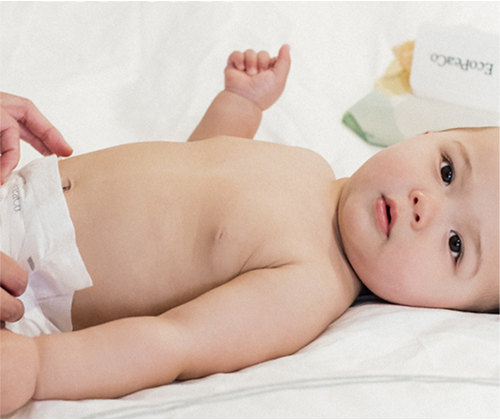Dealing with a colicky baby can be a challenge for sleep-deprived parents. When a baby wakes up fussy at night, it’s known as the “witching hour”— a period where nothing seems to calm the baby to sleep.
If you’ve been pondering how to soothe a fussy newborn at night, read this blog post for ways to make falling asleep a breeze.

Why Is My Baby Fussy At Night?
First, it’s important to remember that “fussy” means different things to parents. Generally speaking, “fussy” can loosely translate to “restless.” Every child has a unique temperament, so there’s no standard example of a fussy baby.
When searching for reasons why your baby is fussy at night, refer to the following lists of common causes that could affect them and simple solutions to the problem.
Fussy Newborn Causes
- Overtiredness
- Overstimulation
- Temperature (too hot or too cold)
- Growth spurt hunger
- Slow milk flow (low prolactin levels)
- Gas
- Colic
Fussy Newborn Solutions
- Skin-to-skin contact. Wear your baby or hold them in your arms to help regulate its temperature.
- Swaddle them. Creature comforts work!
- Bicycle their legs in the air. This technique can help relieve constipation.
- Spend extra time burping. Release those gasses!
- Switch up your diet. If you breastfeed and your baby shows signs of discomfort, consider the foods you’ve been eating that may contribute to the problem (like cruciferous veggies).
- Change their formula– or try a ready-made version from your favorite brand.
- Try slow-flow bottle nipples. They can help decrease the air entering your baby’s digestive system with milk.
- Alter your breastfeeding position. The slightest adjustment can impact your milk flow and satisfy your baby.
And if all else fails, you can always resort to baby-friendly over-the-counter options like gripe water.
How to Calm a Fussy Baby?
It might not be bedtime or milk time when your baby starts to fuss, so here are some other ways to calm them without trying to put them to sleep or feed them: Depending on the time
- Get outside. Put them in the stroller and take a walk. The fresh air and change of environment are great for your baby, and the rhythm or pace of your walk may settle them.
- Make soft noise. Try ssshhh-ing them, playing peaceful music, or turning on white noise in the background. Anything to lull them into a calmer state.
- Reduce stimulation. Get rid of distractions by turning down the lights and limiting noise.
- Massage them. A baby facial or oil massage is a great way to incorporate skin-to-skin contact and comfort your child through touch.
- Take a bath. The warm water is not only a great distraction, but it can be relaxing.
When Do Babies Stop Crying At Night?
It’s hard to give a finite answer to this question because all babies are different, and when they stop crying at night is purely situational. But did you know that babies have a calming reflex?
Think about how the tap of a hammer can trigger your knee. Similarly, a baby’s calming reflex can kick in with particular actions. And when it does, it can act as an off-switch for crying.
Depending on what sensations remind your newborn of the womb, they can act as a reset switch. For example, the warmth of your breast may remind them of the heat in your womb, and when you hold them close to your chest, they immediately calm.
At 2-3 weeks of age, your newborn may be getting fussier because they are hitting a growth spurt, which may result in cluster feeding. This pattern intensifies around the 6-week mark and can continue till 3-4 months of age when the “witching hour” tapers off.
Key Takeaways
Case in point, there are many reasons why your newborn may be fussy at night, but there are also many ways to help them settle down. If none of our suggestions work for you, talk to your pediatrician.



